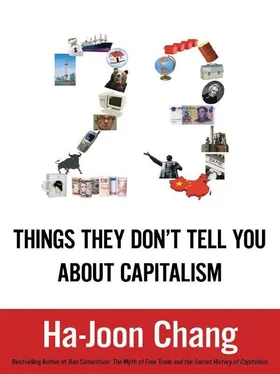Following the 2008 financial crisis, the prices of loans (if you can get one or if you already have a variable rate loan) have become a lot lower in many countries thanks to the continuous slashing of interest rates. Was that because suddenly people didn’t want loans and the banks needed to lower their prices to shift them? No, it was the result of political decisions to boost demand by cutting interest rates. Even in normal times, interest rates are set in most countries by the central bank, which means that political considerations creep in. In other words, interest rates are also determined by politics.
If wages and interest rates are (to a significant extent) politically determined, then all the other prices are politically determined, as they affect all other prices.
We see a regulation when we don’t endorse the moral values behind it. The nineteenth-century high-tariff restriction on free trade by the US federal government outraged slave-owners, who at the same time saw nothing wrong with trading people in a free market. To those who believed that people can be owned, banning trade in slaves was objectionable in the same way as restricting trade in manufactured goods. Korean shopkeepers of the 1980s would probably have thought the requirement for ‘unconditional return’ to be an unfairly burdensome government regulation restricting market freedom.
This clash of values also lies behind the contemporary debate on free trade vs. fair trade. Many Americans believe that China is engaged in international trade that may be free but is not fair. In their view, by paying workers unacceptably low wages and making them work in inhumane conditions, China competes unfairly. The Chinese, in turn, can riposte that it is unacceptable that rich countries, while advocating free trade, try to impose artificial barriers to China’s exports by attempting to restrict the import of ‘sweatshop’ products. They find it unjust to be prevented from exploiting the only resource they have in greatest abundance – cheap labour.
Of course, the difficulty here is that there is no objective way to define ‘unacceptably low wages’ or ‘inhumane working conditions’. With the huge international gaps that exist in the level of economic development and living standards, it is natural that what is a starvation wage in the US is a handsome wage in China (the average being 10 per cent that of the US) and a fortune in India (the average being 2 per cent that of the US). Indeed, most fair-trade-minded Americans would not have bought things made by their own grandfathers, who worked extremely long hours under inhumane conditions. Until the beginning of the twentieth century, the average work week in the US was around sixty hours. At the time (in 1905, to be more precise), it was a country in which the Supreme Court declared unconstitutional a New York state law limiting the working days of bakers to ten hours, on the grounds that it ‘deprived the baker of the liberty of working as long as he wished’.
Thus seen, the debate about fair trade is essentially about moral values and political decisions, and not economics in the usual sense. Even though it is about an economic issue, it is not something economists with their technical tool kits are particularly well equipped to rule on.
All this does not mean that we need to take a relativist position and fail to criticize anyone because anything goes. We can (and I do) have a view on the acceptability of prevailing labour standards in China (or any other country, for that matter) and try to do something about it, without believing that those who have a different view are wrong in some absolute sense. Even though China cannot afford American wages or Swedish working conditions, it certainly can improve the wages and the working conditions of its workers. Indeed, many Chinese don’t accept the prevailing conditions and demand tougher regulations. But economic theory (at least free-market economics) cannot tell us what the ‘right’ wages and working conditions should be in China.
I don’t think we are in France any more
In July 2008, with the country’s financial system in meltdown, the US government poured $200 billion into Fannie Mae and Freddie Mac, the mortgage lenders, and nationalized them. On witnessing this, the Republican Senator Jim Bunning of Kentucky famously denounced the action as something that could only happen in a ‘socialist’ country like France.
France was bad enough, but on 19 September 2008, Senator Bunning’s beloved country was turned into the Evil Empire itself by his own party leader. According to the plan announced that day by President George W. Bush and subsequently named TARP (Troubled Asset Relief Program), the US government was to use at least $700 billion of taxpayers’ money to buy up the ‘toxic assets’ choking up the financial system.
President Bush, however, did not see things quite that way. He argued that, rather than being ‘socialist’, the plan was simply a continuation of the American system of free enterprise, which ‘rests on the conviction that the federal government should interfere in the market place only when necessary’. Only that, in his view, nationalizing a huge chunk of the financial sector was just one of those necessary things.
Mr Bush’s statement is, of course, an ultimate example of political double-speak – one of the biggest state interventions in human history is dressed up as another workaday market process. However, through these words Mr Bush exposed the flimsy foundation on which the myth of the free market stands. As the statement so clearly reveals, what is a necessary state intervention consistent with free-market capitalism is really a matter of opinion. There is no scientifically defined boundary for free market.
If there is nothing sacred about any particular market boundaries that happen to exist, an attempt to change them is as legitimate as the attempt to defend them. Indeed, the history of capitalism has been a constant struggle over the boundaries of the market.
A lot of the things that are outside the market today have been removed by political decision, rather than the market process itself – human beings, government jobs, electoral votes, legal decisions, university places or uncertified medicines. There are still attempts to buy at least some of these things illegally (bribing government officials, judges or voters) or legally (using expensive lawyers to win a lawsuit, donations to political parties, etc.), but, even though there have been movements in both directions, the trend has been towards less marketization.
For goods that are still traded, more regulations have been introduced over time. Compared even to a few decades ago, now we have much more stringent regulations on who can produce what (e.g., certificates for organic or fair-trade producers), how they can be produced (e.g., restrictions on pollution or carbon emissions), and how they can be sold (e.g., rules on product labelling and on refunds).
Furthermore, reflecting its political nature, the process of re-drawing the boundaries of the market has sometimes been marked by violent conflicts. The Americans fought a civil war over free trade in slaves (although free trade in goods – or the tariffs issue – was also an important issue). [1] 1 On how tariff (hampering free trade in goods) was another important issue in the making of the American Civil War, see my earlier book Kicking Away the Ladder – Development Strategy in Historical Perspective (Anthem Press, London, 2002), pp. 24–8 and references thereof.
The British government fought the Opium War against China to realize a free trade in opium. Regulations on free market in child labour were implemented only because of the struggles by social reformers, as I discussed earlier. Making free markets in government jobs or votes illegal has been met with stiff resistance by political parties who bought votes and dished out government jobs to reward loyalists. These practices came to an end only through a combination of political activism, electoral reforms and changes in the rules regarding government hiring.
Читать дальше






![Ally Carter - [Gallagher Girls 01] I'd Tell You I Love You But Then I'd Have to Kill You](/books/262179/ally-carter-gallagher-girls-01-i-d-tell-you-i-lo-thumb.webp)





